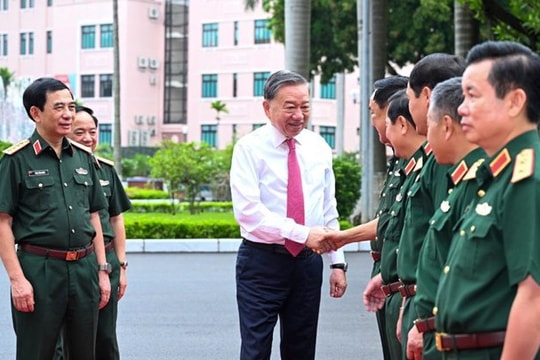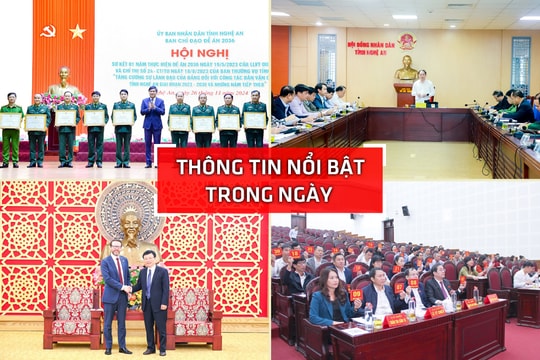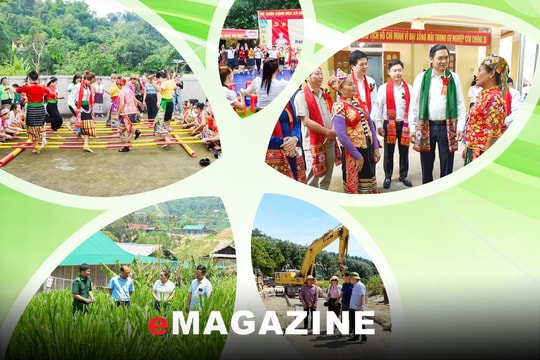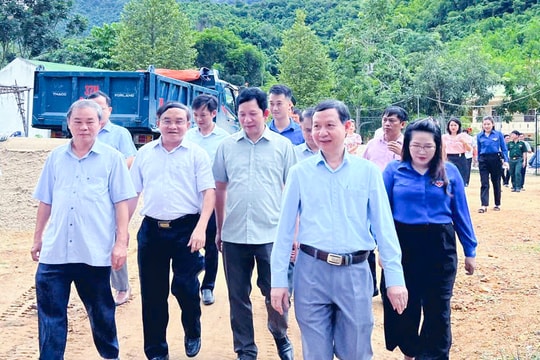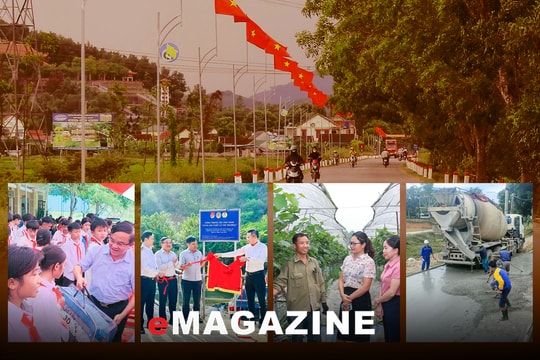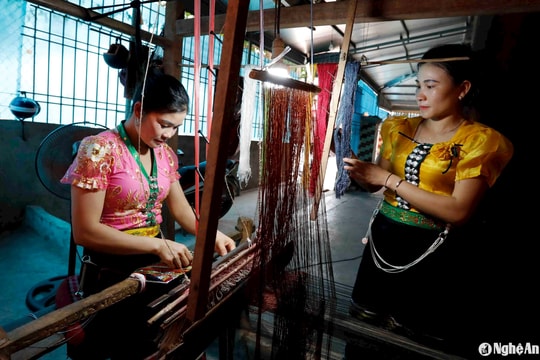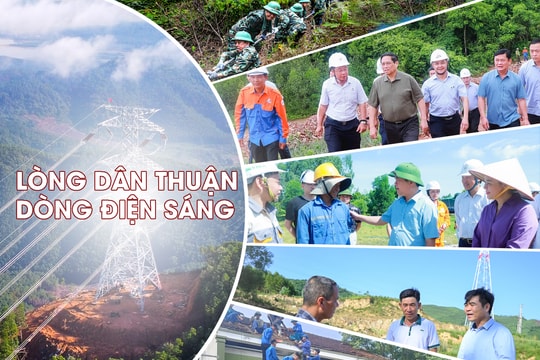'Handbook' of mass mobilization work in the new situation
(Baonghean) - Ho Chi Minh's thoughts on the role of the masses have been expressed throughout his revolutionary activities. President Ho Chi Minh's policy of great national unity and his views on mass mobilization work are extremely broad areas, mentioned by him in many different works, speeches and articles.
Among them, the work "Mass Mobilization" is a typical article with great value in both theory and practice, and is still relevant today. It can be said that this is the "Platform" on mass mobilization work of our Party in the cause of revolutionary struggle for national liberation, national unification and in the entire cause of building and defending the socialist Vietnamese Fatherland.
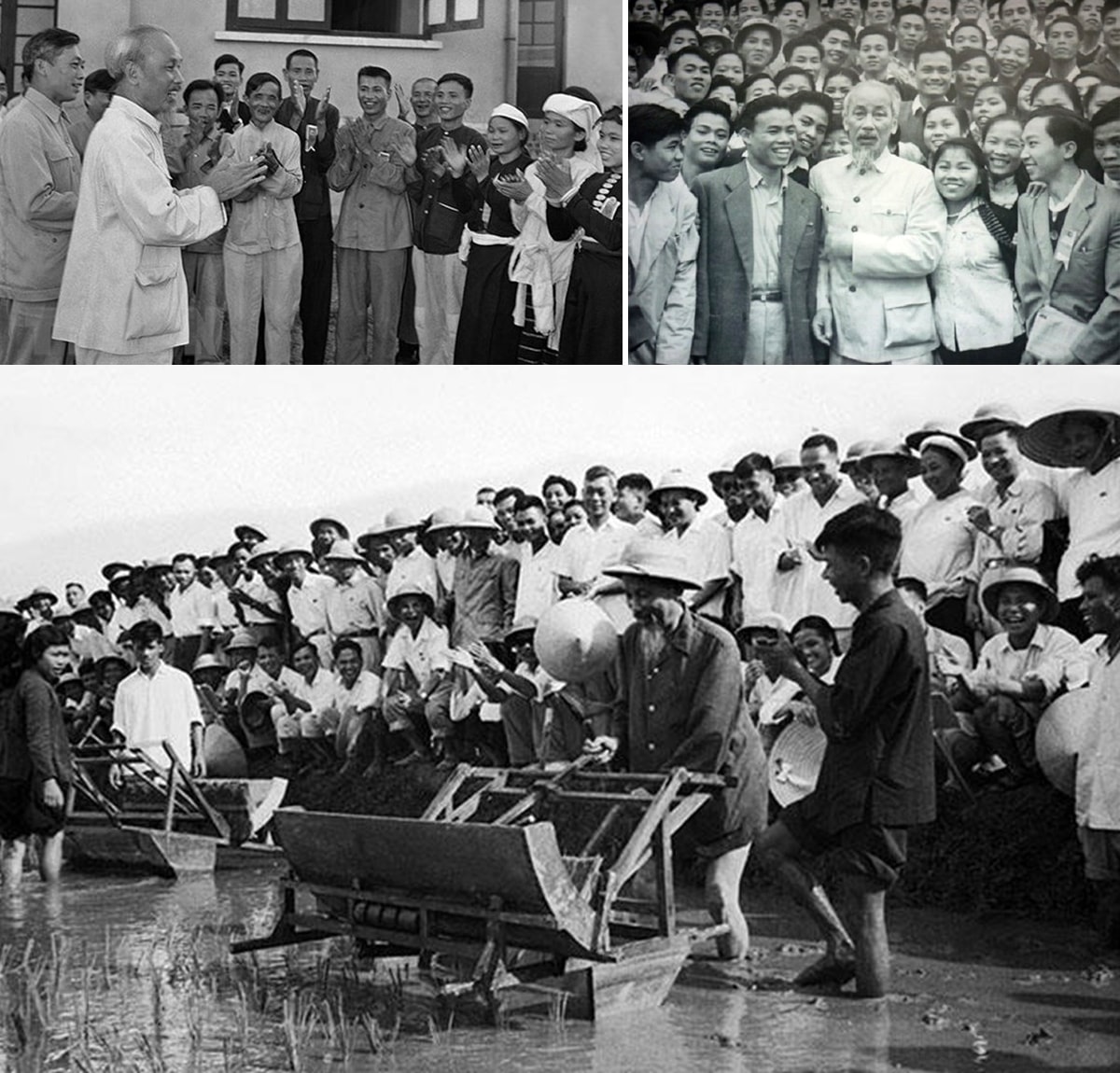 |
| Photos from left to right, top to bottom: Uncle Ho met with delegates attending the National Congress of Heroes and Emulation Fighters in the agricultural and labor exchange sectors in Hanoi (May 23, 1957); Uncle Ho took a photo with youth delegates attending the 3rd National Youth Union Congress in Hanoi, 1961; Uncle Ho visited the Hanoi Department of Agriculture and Forestry and tested the rice transplanter in the Department's experimental field (July 1960). Documentary photo |
70 years ago, in 1949, when Vietnam had just gained power for 4 years, there appeared a group of cadres who showed signs of bureaucracy, distance from the people, and lack of democracy; some places did not pay attention to mass mobilization work. In that context, President Ho Chi Minh wrote the article "Mass Mobilization" under the pseudonym XYZ published in the newspaper Su That, issue 120, published on October 15, 1949.
The title is just two short words: "Mass Mobilization", at the beginning of the article Uncle Ho wrote:"The issue of mass mobilization has been talked about a lot and discussed thoroughly, but because many localities and many officials do not fully understand and do not do it correctly, it needs to be mentioned again."
Here, Uncle Ho said "thoroughly understand" which means to understand the nature of the problem, both the content and the form. Therefore, when cadres come to the people, they must understand the people's hearts, their thoughts and aspirations, and must understand the role, position, and importance of mass mobilization work.
With 573 words, the article is divided into 4 parts, (introduction: Our country is a democratic country; part two: What is mass mobilization; part three: Who is in charge of mass mobilization; part four: What should mass mobilization be like).
Uncle Ho's article "Mass Mobilization" has comprehensively demonstrated and quite fully outlined the content of the concept of mass mobilization and the content and process of mass mobilization work. Studying all four issues, we will understand more deeply and fully Ho Chi Minh's thoughts on mass mobilization work. The issues Uncle Ho raised in the article are really easy to understand and remember, and everyone can relate them to their own responsibility for mass mobilization work.
He wrote:“Our country is a democratic country: All benefits are for the people. All powers belong to the people. The work of innovation and construction is the responsibility of the people. The cause of resistance and nation building is the work of the people. The government from the commune to the Central Government is elected by the people; the organizations from the Central to the commune are organized by the people. In short, power and strength are in the people.”
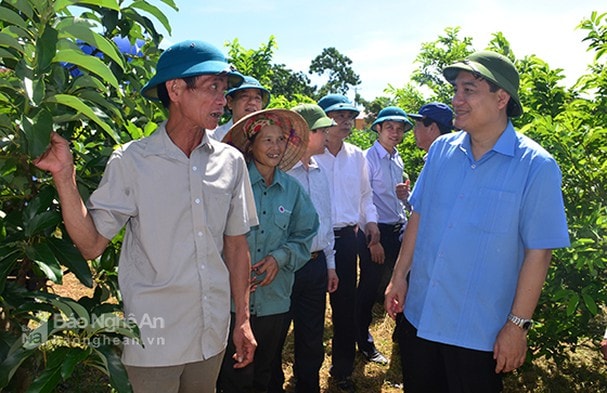 |
| Provincial Party Secretary Nguyen Dac Vinh visited the avocado growing model of Mr. Tran Hung Dao's family in Nghia Phu commune, Nghia Dan district. Photo: Thanh Duy |
From that point of view, Uncle Ho raised the issue that revolutionary cadres, no matter who they are, must do mass mobilization and must attach importance to mass mobilization. At the end of the article, Uncle Ho wrote two decisive sentences:“If the people's movement is poor, everything will be poor. If the people's movement is good, everything will be successful.”“Everything is bad” means failure, there will be nothing left; “Everything is successful” also means good mass mobilization is a factor for the success of the revolution.
From that, we can conclude: Mass mobilization is a strategic issue of the Party, a method of mobilization, existence and development of the Party. "Poor mass mobilization" and "Skillful mass mobilization" decide the fate of the regime.
Uncle Ho's words in the past are now truly a stern warning for the current period! Based on those arguments, the question is "is it true that a basic measure of the effectiveness of mass mobilization work is the people's hearts and trust in the regime, in the Party, government agencies at all levels, political and social organizations, in party members, cadres and civil servants associated with their attitudes, work performance capacity, and personal moral qualities", not mainly achievements, numbers exceeding this or that target.
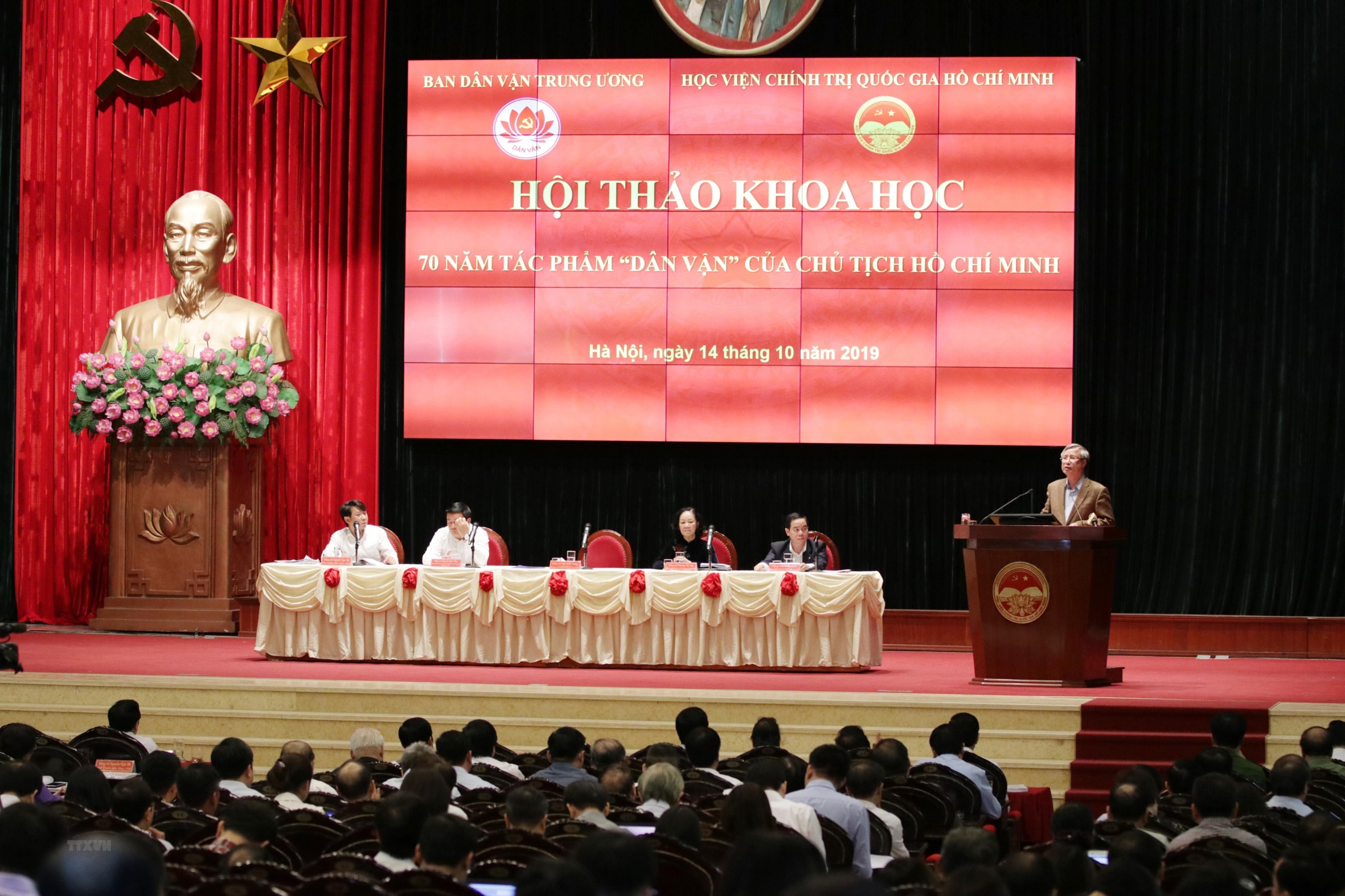 |
| Workshop on 70 years of President Ho Chi Minh's work "Mass Mobilization" in Hanoi. Photo: Phuong Hoa/VNA |
Looking at the current situation, there is no shortage of good things that are recognized by the people - demonstrating the achievements of the mass mobilization work of the entire political system, but there are also events that make the people dissatisfied.
Therefore, the relationship between the Party, the State and the people is damaged. Corruption, bureaucracy, waste, buying positions, schools, grades, and sentences… are rampant, causing people to lose faith.
The Party and State's policies towards farmers in terms of land compensation, land restitution, project planning, and suspended projects make people disagree. Once people are not at peace, the relationship between the Party, the State, political and social organizations and the people declines, it cannot be said that mass mobilization is good.
In the article, Uncle Ho raised a topical question:"Who does the mass mobilization work?"He also answered immediately:“All government officials, all union officials and all members of people's organizations (Lien Viet, Viet Minh...) must be in charge of mass mobilization.”That means the entire political system must do mass mobilization.
Analysis shows two clear problems:
The first:All cadres, party members, union members, and association members, without exception, in the political system must be responsible for (doing) mass mobilization. (The Party at that time did not come out publicly, so party members were implicitly understood to be union cadres).
Monday:Although Uncle Ho did not raise the issue of who is in charge and who is in charge, it was not by accident or coincidence that he mentioned government officials first. Because if government officials do not pay attention to mass mobilization work in performing their socio-economic management functions, or are bureaucratic and corrupt, causing trouble for the people, or issue many policies that are not in line with the people's wishes, then even if the organization tries its best to do mass mobilization, this work of the entire political system will still be ineffective.
Uncle Ho criticized cadres 70 years ago, but it seems to us today: "The big flaw in many places is that they look down on mass mobilization. They appoint a committee or a few people, but often appoint incompetent cadres and then ignore them. If they succeed in mobilizing, that's good, if they fail, that's fine too. Other cadres do not look after or help, and consider themselves not responsible for mass mobilization. That is a very big and harmful mistake."
He said:“Government officials and local union officials must discuss carefully and divide the work clearly…”. “First of all, we must find every way to explain to each citizen clearly: That work is in their interest and their duty, they must enthusiastically do it.
The second point is that in any matter, we must discuss with the people, ask for their opinions and experiences, and together with the people, make a plan that is practical for the local situation, then mobilize and organize the entire population to implement it. During the implementation, we must monitor, help, urge and encourage the people. When the implementation is complete, we must review the work with the people, draw lessons, criticize and reward them.
With the above ideas of Uncle Ho, we can summarize and summarize them into a general method and motto for mass mobilization work in the conditions of the ruling Party: It is the consistent coordination between the state management of the government and the propaganda and mobilization work of the mass movement of political organizations to implement the policies of the Party and the State, meeting the interests and rights of the people according to the motto: people know, people discuss, people do, people inspect. Cadres and Party members doing mass mobilization work must follow Uncle Ho's teachings:“The mind thinks, the eyes see, the ears hear, the feet walk, the mouth speaks, the hands work.”
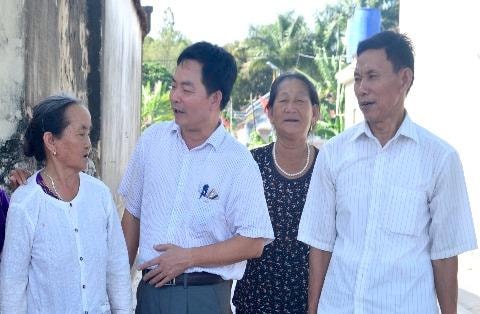 |
| Leaders of Quynh Xuan ward (Hoang Mai town) discussed and grasped the thoughts and aspirations of people in block 9. Photo: PV |
To do well in mass mobilization work in the coming time, it is necessary to solve the following 3 problems well:
The first,Regarding political and ideological work, it is necessary to make cadres and party members aware of the strategic importance of mass mobilization work according to Ho Chi Minh's ideological theses. It is necessary to create a mechanism to force all cadres and party members to do mass mobilization work, and strictly handle all behaviors and actions that are against mass mobilization.
Monday,must deeply absorb Uncle Ho's teachings"If the people's movement is bad, everything will be bad. If the people's movement is good, everything will be successful.", cadres must be exemplary, say what they do, always for the benefit of the people; always take the lead in movements, including the emulation movement "Skilled mass mobilization". Must find every way to explain to each citizen clearly: That work is in their interest and their duty, they must enthusiastically do it.
Tuesday,The emulation movement "Skilled mass mobilization" must stand on the people's viewpoint and interests. That is an important factor to promote the people's internal strength and create the sustainable vitality of the movement.
The method of mass mobilization must be good, with regular contact and dialogue with the people to resolve emerging, urgent, and prominent issues from the grassroots.
Focus on propaganda work, replicate the model, typical example of "Skilled Mass Mobilization"; the entire political system gets involved, has creative ways of doing things, suitable to the conditions in each locality and unit. Do a good job of emulation and reward in the emulation movement "Skilled Mass Mobilization".

